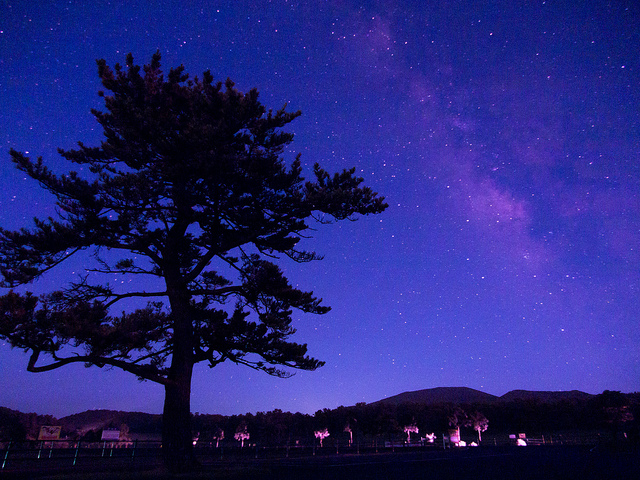
Silent Night, Holy Night
We forget stillness is at the heart of our holidays.
It is easy for us to glance at our calendars and realize we have only seven more days to get ready. We load up our schedules with shopping and events, parties and expectations.
Some of us stay up late into the night preparing for what we hope will be “the best Christmas ever.” We are busy buying and wrapping, planning and plotting, remembering which secrets to keep from whom.
Many of us push ourselves to meet our own expectations or those of other people. We do not have time for a silent night. Too many things still need to get done.
It is almost as if we feel this holiday revolves around us. Everything seems to depend on what we accomplish, on how well our plans come together. We have traditions which must be continued, expectations which must be exceeded.
We appear to hold ourselves responsible for whether this holiday will be a success or a failure.
I experience holidays differently. The more time I can spend listening to sacred stillness, the better.
A silent night, or one which includes time for stillness, gives us time to reflect on what this holiday means.
We get caught up in holiday trappings and events and it is easy for us to forget what this holiday is about. Soon every holiday feels the same as we celebrate them all in the same ways.
How can we remember what each holiday means when we do not take any time to reflect? When we do not listen to sacred stillness we forget why we are doing what we are doing. We tend to move from expectation to expectation.
It does not sound like celebrating to me.
Why Our Silent Night is Significant
How do we celebrate the deepest aspects of our lives?
It is a challenge to celebrate well. Life moves quickly. Even when we decide to commemorate a particular event, all the traditions can get in the way of our true celebration.
I live in a culture which often celebrates with consumption. Our special days are filled with eating certain foods and spending money. Each holiday has its own requirements, whether it is roast turkey or candy canes, colored eggs or hot dogs.
It is easy for all our expectations and traditions to distract us from the underlying meaning we are celebrating.
It is almost as if the holidays themselves were just excuses to celebrate how much we can spend.
My listening to sacred stillness helps me begin to reflect about celebrating spiritual life. We have ways to celebrate historic events and people whose example we want to follow. We even celebrate some concepts, like independence.
How do we celebrate spiritual life? Are there ways to celebrate spiritual life which do not distract us from deep underlying spiritual truths?
Part of the challenge is we tend to see spiritual life as particularly personal and individual. Each of us seems to understand spiritual life and depth in our own way. Each of us decides what to celebrate, and how we celebrate it, for ourselves. It is a challenge for us to celebrate spiritual life together.
For me, celebration grows out of reflection and contemplation. I need a quiet place to remember, appreciate, and begin celebrating. A silent night is a good place for me to start.
My silent night does not need to be absolutely silent, nor does it need to last all night long. It does not need to happen at night.
Obstacles to Our Silent Night
Our silent night begins as we find sacred stillness. Some of us find the experience of listening to sacred stillness natural for us. We are comfortable and calm, like rocking in a rocking chair. We find ourselves feeling like we are arriving home after a long trip.
Others of us have more challenges to overcome. We may feel intimidated by the idea of sacred stillness, of a silent night. Our silent night may overwhelm us. Some of us want to spend our silent night being perfectly still and feel frustrated when it is less than perfect.
It is important for us to recognize the obstacles to our listening to sacred stillness are in our expectations.
Listening to sacred stillness is a practice. We cannot expect ourselves to do it perfectly from our very beginning. The more we expect of ourselves the more difficult it will be for us to satisfy our own expectations.
Like any other practice, the strength of our listening to sacred stillness is in our continuing to practice. If we get frustrated and stop practicing we will not be listening to sacred stillness.
Our silent night would be over before we have even begun.
Practicing Our Silent Night
As we practice listening to sacred stillness our silent night grows within us.
Each time we listen is a new opportunity for us to be open to spiritual life all around us and within us.
There is no single right answer and no single right way for us to listen to sacred stillness. Our silent night draws us into the depth and meaning of the everyday.
Each day we sit still and listen to sacred stillness. Our practice does not transform us overnight. There are times when we do not feel like sitting in stillness, when we might not look forward to listening.
Our practice is about listening even when we do not particularly feel like it, when it is not convenient.
We listen without expecting anything dramatic to happen.
Our silent night is not about waiting for an intense spiritual experience. We sit in stillness open to the possibilities of spiritual life within us.
Stillness is at the heart of all our holidays. We practice being open to what spiritual life has for us to hear.
How are we celebrating our silent night today?
When can we find the silent night at the heart of this holiday this week?
[Image by funcrush28]
Greg Richardson is a spiritual life mentor and coach in Southern California. He is a recovering attorney and university professor, and a lay Oblate with New Camaldoli Hermitage near Big Sur, California. Greg’s website is StrategicMonk.com, and his email address is [email protected].












